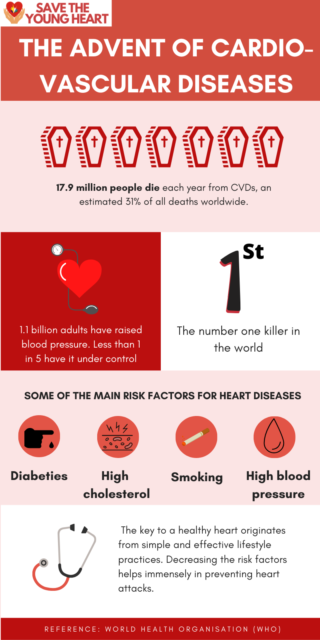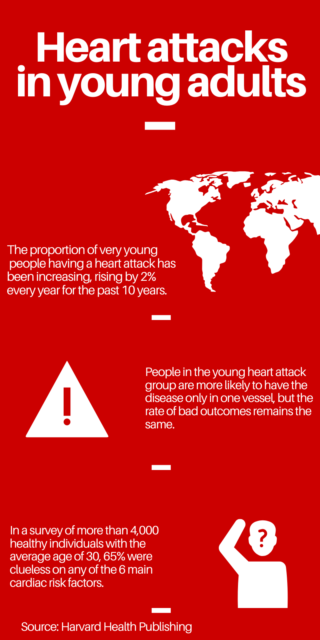Why your heart is
so important
What is the heart?
The heart is a wonderful organ which supplies nutrients and fresh oxygen to our body through the circulatory system. The heart receives the impure blood from our body and sends it to the lungs for the exchange of carbon dioxide for fresh oxygen.
The Heart is a bag of muscles, mainly the myocardium. This myocardium also needs a supply of fresh blood for its adequate function. The heart uses these muscles to pump around 72 times per minute or 100,000 times a day! However, if it stops for less than 3 minutes, life will cease to exist!
The rampage of heart diseases.
Heart diseases have alarmingly increased in all age groups. Nowadays the young and middle-aged are being affected more than the older generation. The main causative factors are stress, early onset of diabetes, hypertension, high cholesterol, smoking, and family history.
Stress is the most common factor in the lives of students, IT graduates, Doctors, businessmen, and housewives. The pressure and stress start with school-going children. This stress keeps building up in the highly competitive atmosphere until the child graduates. The emotional and physical stress causes unhealthy competition, lack of career ambition, marital discord, loneliness, job insecurity, sedimentary lifestyles, alcohol addiction, and mobile addiction.
What does stress do to the heart?
The incidence of heart attacks in young adults has increased exponentially because of the changes in lifestyle. The invisible stress affects the whole body and creates problems that you do not notice early on. So what does stress do to the heart?
All the blood vessels in the human body are lined by a membrane called the endothelium. This endothelium reacts to any changes in the mental or physical sphere of the human body in the same way the blood vessels which supply the heart, also react to any type of stress. In young adults, constant relentless stress causes swelling or inflammation of the lining endothelium. Slowly over a period of time, this gets covered by fat or lipids. This lipid deposition gradually narrows the heart arteries and reduces the blood supply to the heart. These unstable plaques can rupture because of some heightened emotion and block a coronary artery. This can give rise to a massive heart attack. The heart attack does not give anybody leniency to respond or reach the hospital.
How the heart affects the other organs.
All the organs in our bodies are interrelated. The same endothelium lines the blood vessels of the brain, heart, kidneys, and other organs. The change in daily lifestyle and pollution has lead to an increase in the early onset of various diseases like diabetes, hypertension, Alzheimer’s, arthritis, etc.. Any form of stress causes the release of the stress hormones as mentioned before. These stress hormones affect the endothelium in different parts of the body. It can be the brain or heart or kidney or any other organ. If the diseases are not taken care of, it can spread and affect other organs. For example, if a person has a heart attack, it sends ripples that tends to affect every organ in the body.
Heart attacks in young IT professionals
An IT professional starts the day before sunrise and ends after sunset, this highly restricts the daily quota of the sunlight needed for the human body. Office work is done in an air‐conditioning room with no ventilation, and this same air-conditioning forces people to breathe the air which is exhaled by others.Fast food is another substance that this demographic feeds on. This dead food lacks nutritional value and lacks any enzymes to aid in digestion. Slowly and gradually all sorts of junk food spoil the digestive ability to the extent of irreparable damage. Smoking and alcohol then seem like the easy way out for work-related stress.
Thus nowadays younger people are getting heart attacks. It is very sad for a family to lose their breadwinner, and it is a great loss for the nation as a whole. Because of heart attacks, the heart muscles become weak, leading to improper contraction of the heart. Repeated heart attacks weaken the heart muscle further, this leads to anxiety, shortness of breath, and an increase in chest discomfort.
We should start being aware of the needs of the heart and the body. Start early, drive slowly, and reach safely. We ask these young people to look after their heart and health, to avoid falling prey to heart diseases at an early age.
Detecting this disease early.
The common question we get asked is “How will I know if I have a heart disease?”
Any pain in the chest, above the diaphragm, back, below the chin, in the shoulder radiating to the fingers, should answer the question above and should be treated seriously. The chest discomfort or heaviness that comes with exertion is known as angina. If the discomfort is persistent or happens on a regular basis it needs to be investigated in a center with facilities of the Echo and treadmill tests.
Heart attack or myocardial infarction is an emergency. If the pain comes without any activity and is associated with anxiety, sweating, nausea, vomiting, it is most probably a heart attack. The heart muscles start to die because of the inadequate blood supply to the heart and you should immediately call an ambulance to rush to the nearest hospital. The doctor will take an ECG, 2D ECHO and if needed, blood tests to rule out the heart attack if the situation is uncertain.
Preventive strategies for heart attacks
Prevention strategies will delay or stop the damage done to the endothelial lining of the blood vessels. The preventive aspect involves the modification of your lifestyle. If you get up early in the morning you will have enough time for yoga, meditation, and walking, which will prepare you to face your daily challenges. With adequate water intake according to our age and physical state, we will ensure that the kidneys will throw out the toxins produced as a result of metabolism.
Throughout the day, by being aware of the food that we eat, how we eat, how much we eat, and when we eat, we will take care of our digestive system well. Ayurveda emphasizes that a healthy gut will take care of almost 70 to 80 percent of the diseases. Healthy recreation in the form of games, service to the downtrodden, spending time with family will also help in relieving the stress.
All the above changes in lifestyle will support in the prevention of heart diseases.




